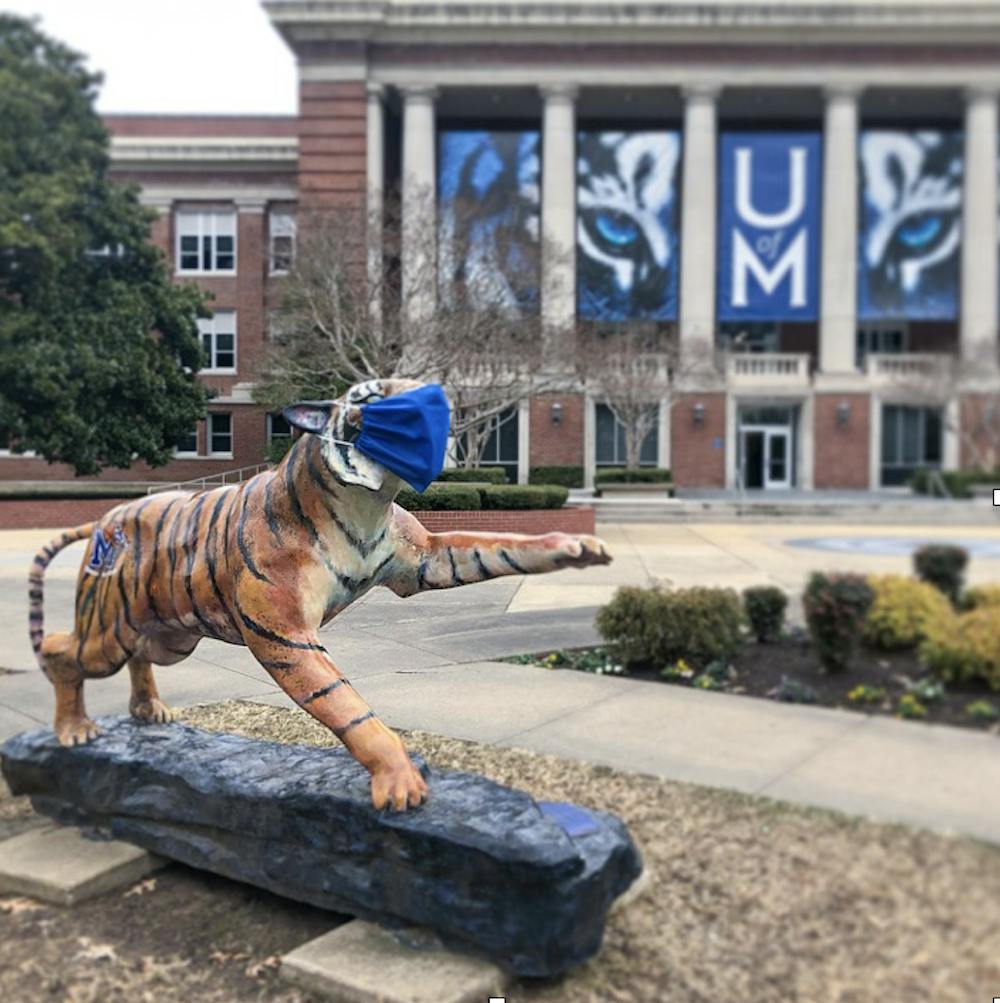Students are slowly returning to campus as COVID-19 vaccinations continue to be administered in Shelby County and community health conditions have been steadily improving. Many students at the University of Memphis expressed excitement to get the vaccine themselves while others showed hesitancy based on the newness of the vaccine and how abnormally quick it was approved.
“I fully believe in the vaccine. My mom’s a front line health care worker at a hospital in St. Louis and she’s already gotten her vaccine,” one student said.
It should not come as a surprise that students in health studies programs are ready to receive the vaccine themselves and want to encourage others to take it as well.
“You’ve got two biomedical engineering students here that fully believe in the creation of new medicine,” the student said, speaking for herself and a friend.
A tiger statue at the university, adorned with a massive face covering, has been serving as a role model and reminder for students to wear a mask while on campus. Masks have been a requirement for students and faculty on campus since their return.
Although a majority of students at the University of Memphis are excited for the vaccine, not everyone shares in their enthusiasm. Liberal studies major Baylon Brown has decided to fight the virus with good hygiene instead.
“I’m African, I do home remedies,” Brown said.
He said that these home remedies include washing his hands, taking baths, and wiping down surfaces with Lysol wipes.
P.h.D. student Latetrica Wilson also expressed hesitancy over taking the vaccine for herself.
“Health-care in America is not free, so why are they giving out free shots?” Wilson said.
While this concern has been voiced across the nation, not only in Shelby County, COVID-19 vaccines are only partly free. Vaccine recipients can still be charged an administration fee by the organization that they receive it from, according to the CDC.
Although common immunization shots are also vaccines, the coronavirus vaccines currently in distribution are different due to the fact that they do not contain a live, weakened version of the virus. Wilson said that she only feels comfortable taking school-required immunization shots like the ones for Hepatitis.
Two of the most popular variants of the vaccine use mRNA technology, meaning that they contain material from the virus that teaches the body to create a harmless protein that is unique to the virus. The body then builds antibodies against the protein.
Both vaccines were given emergency use authorization by the FDA, which means that they were approved for public use in less time than normal, due to the urgent need to get them out. This has created another reason for Wilson, and others, to doubt the efficacy of the vaccine.
She said that even if the COVID-19 vaccine became required by the school, she still wouldn’t take it. Several students also suggested that they would take the vaccine, but want to wait until others have taken it first to gauge how it affects them.
“My mom works in health care. She took it and got sick,” said Mario Nicholson, an exercise science major at the university.
Brown’s and Wilson’s negative dispositions mirror a larger trend in the black community overall. A Pew Research study from Dec. 3 found that less than half (42 percent) of Black Americans would get a vaccine if it were available to them. This is compared to 61 percent of their White counterparts.
This information comes as Black Americans have been disproportionately affected by the COVID-19 virus. The latest information by the Shelby County Health Department states that Black residents account for 56% of the overall cases in Memphis.
Hesitancy over taking the vaccine has been attributed to a history of abuse of minority groups by the American medical community. One infamous case, The Tuskegee Study of Untreated Syphilis in the Negro Male, was a study of 600 Black men by the Tuskegee Insititute in Alabama that began in 1932.
What was originally supposed to be a six month study that justified treatments for Black Americans, turned into a forty year medical scandal that allowed the participants to suffer the effects of syphilis even after penicillin was discovered as a cure 15 years after the study began.
Even though there is still an overwhelming need for mass vaccination, community conditions are improving. In a statement made on January 26, the University of Memphis said that it will allow classes that were originally offered face-to-face or in a hybrid format to resume. Normal health guidelines like wearing masks and social distancing will be strictly enforced, the statement said.
Tiger statues can be found wearing face coverings around campus. This was done to promote safe interactions for students and faculty.






